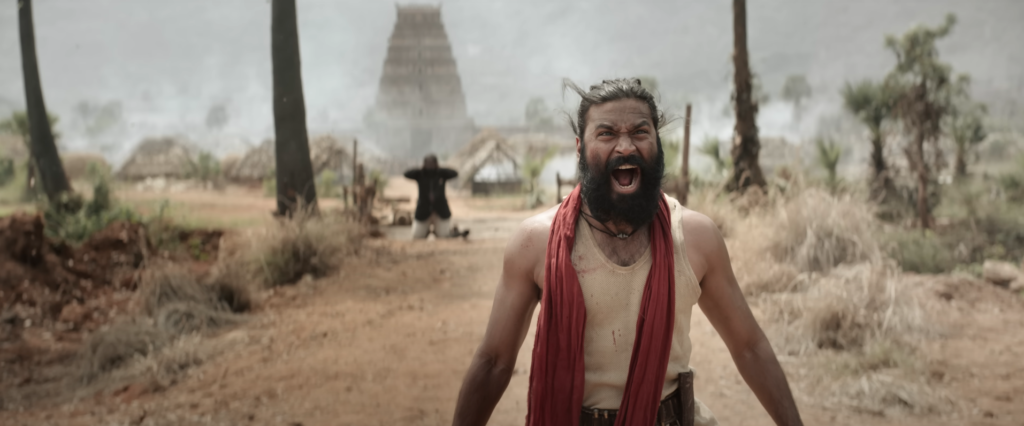Tamil Movie Review: Captain Miller burns down the British Raj with invigorating genre movie pastiche

A down-and-dirty genre picture with a hearty helping of historical resonance, Captain Miller reminds us what “hard-boiled” really means in the context of action filmmaking. For those who thought last year’s Sisu was just a little too tame and cutesy in its creative interpretation of 20th Century history: have I got a movie for you. Unrelenting to the point of madness, this is as pulpy and savage as I’ve ever seen a cinematic glorification of Indian resistance against the British Raj. It makes RRR look like a superhero dress-up party.
After a brief prologue, the film opens like an Indian take on the Western genre, complete with Wanted posters for its titular outlaw, Eesa AKA Captain Miller (played by Dhanush). Miller and his gang actively take on the British battalions responsible for ongoing atrocities in the local village and surrounding areas. In the beginning, with Miller largely shrouded in mystery, this feels like simple vigilante justice operating as a form of political resistance.
But as in most strong genre movies, there’s more lore to be explored than first meets the eye. Co-writer/director Arun Matheswaran delves into the extended backstory of Eesa with real finesse; the film progressively builds upon its propulsive energy, without the amount of time spent in “flashback” mode coming across as a chore. We learn that Eesa was originally assigned the name of “Miller” when he signed up for the British army, a short-lived enlistment that ended abruptly when he and his fellow Indian soldiers were painstakingly forced to massacre their countrymen protesting the British rule. From that day on, “Miller” charted a new course.
Much of the story follows Miller as he hooks up with the members of his ultimate gang, a scrappy but lethal band of resistance warriors working towards the common goal of protecting their fellow Indians and pursuing revenge against the Brits responsible for acts of violence committed against innocent civilians. Among them is Velmathi (played by Priyanka Arul Mohan), the niece of the local king, whose own oppressive policies and tactical choices to appease the Brits make him nearly as much of an enemy as the occupiers themselves. In this dynamic, Captain Miller has something very lightly coded to say about the present, as well.
The macro narrative arc of Captain Miller is that of a revenge movie – pure, simple, and very bloody. But there are other genre delights packed into the film, most notably a major heist subplot that fuels the action heading into Intermission. A key component of the story is a local temple housing a secret statue of the deity Ayyanar Koranar. The local king refuses to allow the villagers inside the temple, restricting access by caste. But when the British attempt to bulldoze the temple and take the valuable statue for themselves, the king must temporarily align himself with Miller to recapture it. This yields one of the most stunning action set-pieces in recent memory in Indian cinema, combining multiple forms of combat.
After Intermission, the film goes into full melee mode. The bodies stack up in an equally exhilarating and grueling fashion, with Miller not only continuing to pursue his quests for revenge and Indian independence, but also now protecting the town’s crown jewel. The climax also promises a bubbling-up of family issues that underlie the earlier events. Miller’s brother Sengola’s (Shiva Rajkimar’s) activities as an Independence fighter played a role in their mother’s death, a rift that is reframed in light of Miller’s own newfound resistance.
The action is a big part of what distinguishes Captain Miller from other creative retellings of Indian Independence. It manages to be both completely exhausting and gruesome – the kind of full-bore violence that best suits a Hard-R revenge epic – while also reflecting extremely skillful craftsmanship. For as overwhelming as the film’s big set-pieces are, they are also so well shot and staged that the audience can’t help but stick with them. Just when you think you’ve had enough as a viewer, there is a shot so strikingly beautiful, it brings you right back in to the action. The distinct ways in which director Matheswaran and cinematographer Siddhartha Nuni shoot the different modes of violence – gun, bazooka, vehicle, knife, sword, fists – help keep the action feeling dynamic and engaging. I would also be remiss if I didn’t note that the music, composed by G.V. Prakash Kumar, really adds to its brute-force impact.
That said, for as much as Captain Miller feels chiefly like a work of virtuoso filmmaking, much of its impact lies in Dhanush’s lead performance. He has a way of capturing the grief and anger of this man – both personal and national – in an extremely raw, primal way. As his hair and beard grow over the course of the film, his propensity for violence gets increasingly feral. As a viewer, you can’t help but feel like you’re going to war right along with him. While Eesa/Miller is not always “likable” in the traditional sense, and one may disagree with his violent radicalism on some level, he unquestionably becomes a root-worthy revenge epic hero. His family backstory is perfectly timed to tie into the emotional crescendos of Dhanush’s performance. His arc is not all that different from John Wick or The Bride’s, but it’s backed by the weight of national pride.
While I’m largely full of praise, the movie does fall short in certain areas. The supporting characters, especially Miller’s gang, aren’t nearly as developed as one might desire. Two women – the aforementioned Velmathi and another revolutionary played by Nivedhithaa Sathish – get the most to do of the bunch. But even they feel like they could have more character backstory to get us invested in the players beyond Miller. I appreciate that the film must also intentionally withhold when it comes to Sengolan’s character to preserve certain third-act reveals, but I still wanted more, earlier on from the brother relationship. The absence of real supporting character depth feels tied to the film’s other main flaw, which is that the second half prior to the final battle comes off as repetitive and a bit sluggish. More fresh interpersonal drama during this stretch, to complement the action, could have better propelled the story towards its climax.
Still, this is a pure genre movie: some minimally-developed supporting characters and action flab are to be expected. I could also ding the film for its characteristically terrible English-language performances by the actors enlisted to play the evil Brits, but this ultimately only enhances its value as pulp (you really want to see those chaps dead!). If we approach Captain Miller as a grindhousey thrill-ride – a nationalist spin on a vigilante movie, a revenge thriller, a war epic, and a Western all thrown into a blender – it passes every test with flying colors. It may not be the most well-mannered exercise in film style, but it certainly gives the ticket-buyer more than their money’s worth.

